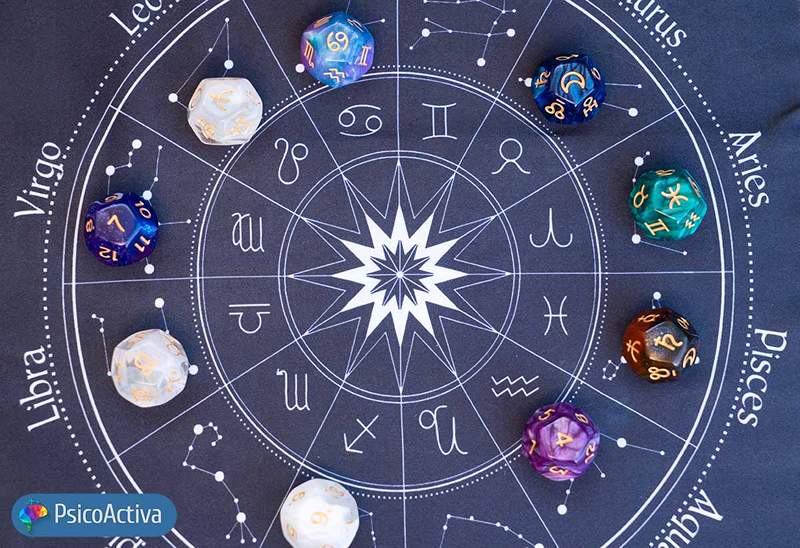The psychological theories that hide behind the horoscope

- 4592
- 220
- Miss Drew Stroman
Discover the Forer effect that is hidden behind the successful predictions of horoscopes
Content
Toggle- What is the horoscope and why there are people who believe in it
- The theoretical basis that supports the horoscope
- The case of the famous businessman Phineas Taylor Barnum
- Bibliography
What is the horoscope and why there are people who believe in it
The horoscope is a prediction and analysis system based on astrology that aims to interpret the influence of celestial stars and bodies in the lives of people and terrestrial events. The "horoscope", which derives from the Greek "hōra" which means "time" and "skopos" which means "observer", refers to the daily, weekly, monthly or annual predictions based on the position of the planets and other celestial bodies At the time of a person's birth, and their relationship with the twelve signs of the zodiac.
Although the horoscope is popular in many cultures and has a long history, it has no scientific basis, The scientific community considers astrology and horoscopes as pseudosciences, Since their statements and methodologies do not meet the criteria and standards of empirical science, however, many people find value in horoscopes as a form of entertainment, spiritual guide or self -knowledge tool.
The horoscope, like any form of belief or system of thought, attracts people for different reasons, but some fundamental factors can be identified.
There is an important cultural and social influence, since in many societies, The stars and planets have had an important role in beliefs and traditions for thousands of years, This intertwining with history and culture can influence the credibility that people give to horoscopes today.
In second place, The desire to understand and anticipate the future is an intrinsic part of the human condition, We constantly ask ourselves what the future holds, either in terms of our health, our relationships or our careers, and the horoscope can provide a kind of guide or map for the future, which is especially attractive in times of uncertainty.
Another reason is the search for identity and self -knowledge, the different signs of the zodiac offer a form of self -exploration and self -understanding, allowing people to identify personality traits or behavior patterns associated with their sign which can be comforting feel that they understand their own behaviors and motivations better.
It is also The influence of confirmation bias, A psychological phenomenon in which we tend to seek and pay attention to the information that confirms our existing beliefs, when people read a horoscope that coincides with their experiences, can perceive it as a validation of the precision of astrology.
For many people, belief in the horoscope is simply a form of fun and entertainment, not all who read the horoscopes necessarily believe in their literal truth, but they can enjoy the speculation and fantasy they provide.
The theoretical basis that supports the horoscope
The phenomenon that takes advantage of the horoscope to "succeed" in its predictions is known as the "force effect" or "barnum effect", this term is derived from an experiment conducted by the psychologist Bertram Forer in 1948. Forer provided his students with a personality test and later handed them the results by seeing that it was a personalized analysis based on the test results, when he actually gave all students exactly the same analysis, which was composed of statements vague and general extracted from the astrology column of a newspaper. The students evaluated the accuracy of the results on a scale of 0 to 5 and surprisingly the average result was 4.26, so that the majority of the students described the evaluation as very precise.
This effect is based on the tendency of people to interpret generic statements as specifically applicable to themselves, Horoscopes often use this technique when using statements that are ambiguous enough to be interpreted in different ways.
Check if you feel identified with these phrases of the horoscope:
"You will face challenges that will test your determination"
- This is vague enough to apply to almost any situation. The challenges can be large or small, and the determination can be interpreted in many ways.
"A financial opportunity can occur soon"
- This could mean anything, from finding some street coins to receiving a job offer. The word "can" also add ambiguity.
"Today is a good day to make significant connections"
- This could be interpreted how to make new friends, have a good conversation with a colleague, or even simply send messages to old friends on social networks.
"You will be more in tune with your emotions in the next few days"
- This is extremely generic and can be interpreted as any change in a person's emotional state.
"The stars suggest that it is the time for a change in your life"
- What exchange rate? Great, small, personal, professional? This statement is so vague that almost any event can be interpreted as compliance with the prediction.
These phrases are examples of how horoscopes often use a vague and general language to create statements that can be interpreted in many ways, this, combined with confirmation bias can cause people to believe that horoscopes are precise and relevant to their personal lives.
 Attribution theories and errors: Who do we blame?
Attribution theories and errors: Who do we blame? The case of the famous businessman Phineas Taylor Barnum
The Forer effect is also known as a varnum effect in reference to P.T. Barnum, a famous promoter and businessman of American shows of the nineteenth century, often related to the motto "there is always a fool born every minute", although there is no conclusive evidence that he really said this phrase. Barnum was known for its circus shows and using exaggerated promotion and advertising tactics to attract people to their events.
The term "Barnum effect" suggests that people are, in a way, loans or easy to deceive, especially when they are presented vague and general statements that can be interpreted as personally significant, this resembles how Barnum attracted people to their shows through bold and sensational statements and promotions, which were often exaggerated or lacked foundation.
In the context of psychology, the Barnum effect refers to the tendency of people to accept ambiguous and general personality descriptions as applicable to themselves, without realizing that these descriptions could also be applied to almost any person, as demonstrated The psychologist Bertram Forer in the aforementioned experiment.
Barnum became famous for being a teacher of sensationalism and exaggerated advertising to promote his shows And attractions, although some of the stories and quotes attributed to Barnum are considered to be anecdotal or even apocryphal.
Some of the phrases or terms attributed to Barnum or that are associated with him or with his advertising style are:
- "The largest show on Earth": This is one of the most famous phrases associated with P.T. Barnum and was used to describe its circus, the Barnum & Bailey Circus. The phrase suggests greatness and spectacularity without equal.
- "There is a fool born every minute": Although it is often attributed to P.T. Barnum, there is no conclusive evidence that he really said this phrase. It is associated with its ability to capitalize on the credulity of the public.
- The use of terms such as "Incredible", "extraordinary" and "amazing": Barnum was known for using striking and sensationalist adjectives in his ads and posters to capture the attention of the public.
- Creation of characters and attractions with exotic or mysterious stories: For example, he introduced an older woman, Joe Heth, like the alleged George Washington babysitter, stating that he was over 160 years old.
- Public challenges and controversies such as advertising tactics: He often created controversy or issued public challenges as a way of attracting attention to his shows, for example, challenged other circuses and promoted rivalries.
Although Barnum is remembered as a visionary of entertainment and advertising, many of its advertising tactics are considered unacceptable or not very ethical by modern standards, especially with regard to the exploitation of people and animals in their shows.
The Forer effect, when we believe what we want to believe
Bibliography
- The Fallacy of Personnel Validation: A Classroom Demonstration of Gullibility - http: // apsychoserver.psych.Arizona.EDU/JJBAREPRINTS/PSYC621/FORER_THE%20FALLACY%20OF%20PERSONAL%20VALIDATION_1949.PDF
- Phineas Taylor Barnum- https: // is.Wikipedia.org/wiki/p._T._Branum
- « Psychological consequences of sexual abuse in minors
- Psychological and emotional abuse in childhood »

